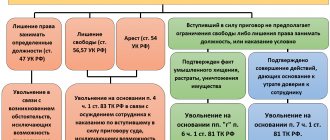Grounds for dismissal
According to the Criminal Code of the Russian Federation, a criminal record is taken to mean all measures that are taken to punish a person for certain illegal actions and that change his legal status. The Criminal Code of the Russian Federation states that the dismissal of a convicted employee must be carried out regardless of the opinions and preferences of the parties.
The regulation of termination of work in a company is regulated by Article 83, paragraph 4 of Article 1, in order to carry out actions to conclude a contract, the following conditions must be met:
- Entry into force of the order according to the official conclusion of the court.
- Taking into custody a person for the period established by the sentence, who is currently registered with the enterprise.
- Deprivation of this citizen, in accordance with the law, of the right to hold this position.
How to properly fire a convicted employee?
83 Labor Code of the Russian Federation.
Termination of an employment contract due to conviction. Since the employee does not fulfill his labor function, there are no grounds for paying him wages. The Labor Code of the Russian Federation does not provide for payments to the employee at the expense of the employer in this case.
There are no legislative explanations on how to record an employee’s absence from the workplace if he is in a pre-trial detention center.
Such an employee cannot be dismissed before the court verdict. According to clause 4, part 1, art. 83 of the Labor Code of the Russian Federation, the basis for dismissal is the conviction of the employee to a punishment that precludes the continuation of his previous work, in accordance with a court verdict that has entered into legal force.
The employee is not paid wages.
In accordance with Art. 129 of the Labor Code of the Russian Federation, wages are remuneration for work depending on the employee’s qualifications, complexity, quantity, quality and conditions of the work performed, as well as compensation payments and incentive payments.
Dismissal of a person sentenced to imprisonment
When dismissing a convicted employee, it is necessary to take into account all the nuances of the court verdict for the employee, otherwise the employer will not in all cases be able to complete the procedure for terminating activities in the citizen’s organization. To do this, let us give an example of situations that an employer needs to understand.
Attention
For the current year, it was determined that in case of a suspended sentence for an employee, the manager should not immediately dismiss the employee. In this case, the law allows the termination of the worker's activities only if his crime is related to the official duties that he performed. This issue is regulated in accordance with Article 83 of the Labor Code.
The employer also has the right to carry out the dismissal procedure if the specialist’s crime negatively affects the professional duties that he performs.
If, by a court verdict, an employee is sentenced to a real prison term and is required to remain in prison, then he is dismissed.
Legal aspects
The Criminal Code of the Russian Federation states that a criminal record is considered to be temporary or lifelong penalties provided for a person who has violated the law. If a person has a criminal record, their rights are limited, and in some cases a permanent ban on certain types of activities is established.
Termination of employment relations with a person serving a prison sentence is carried out under the fourth paragraph of Art. 83.1 of the Labor Code, about which a corresponding note is made in the work book. But dismissal will be lawful only after the court verdict enters into legal force, since until a decision is made in a criminal case, a person is officially considered innocent.
If the employee has not yet been convicted, but has simply been subject to a restriction in the form of temporary isolation (i.e., detention) for the period of the preliminary investigation, there are no grounds for dismissal under the mentioned article, but the accrual of wages is suspended during the investigation. At the same time, if the suspect was subsequently acquitted, the period of his stay in the pre-trial detention center is included in his work experience, since there was a good reason for his absence from work.
We suggest you read: Can a single mother be fired from her job?
When a suspended sentence is imposed, the dismissal of a convicted employee is possible in cases where the committed act is incompatible with the continuation of work, casts a shadow on the professional qualities of the person, or has a direct connection with his job responsibilities. These nuances are described in the relevant paragraphs of Art. 81.1 of the Labor Code, which should motivate the termination of employment relations after the court verdict enters into legal force.
If a decision on the case has not yet been made, but the employee is in custody, he cannot be dismissed due to a disciplinary violation - this action is unlawful and can be appealed in court in the future.
Labor relations with an employee sentenced to correctional labor should be terminated under Articles 78 and 80 of the Labor Code, if there is written permission from the executive inspectorate. Other dismissal options will be considered a violation of the Labor Code.
Procedure
When an organization receives a corresponding letter from the judicial authorities about the entry into force of a court verdict, the following procedure occurs:
- First, you quickly need to draw up a document that will indicate the termination of the employment contract with the enterprise specialist. 3 days are given for the document to be fully prepared and come into force.
- Next, the employer must prepare documents that prove the fulfillment of a legal obligation.
- The next step, on behalf of the company, is a notification sent to the enforcement authority, which corresponds to the execution of the court verdict. Also, therefore, law enforcement authorities have the right to demand from the company copies of the following documents:
- Order to dismiss a convicted employee.
- Entry in your personal file and supporting documents.
- An entry is made into the work book, and payments are made.
Important
It is worth clarifying that if a worker is absent from the place of work in an enterprise while under investigation, the employer cannot consider a disciplinary violation as the reason. This is due to the fact that being under investigation by the authorities is a valid reason for absence.
Also, if the sentence includes the performance of corrective labor, then during the period the completion of work in the organization can be done by agreement of the parties or the worker’s own statement, and the manager does not have the right to do this.
Algorithm for terminating a contract
It is possible to dismiss an employee who has been sent to prison only if there is a document confirming the legality of the enterprise’s actions, so the first thing the employer should do to terminate the employment relationship is to request a copy of the conviction.
To do this, you can contact the relatives of the convicted person or send an official request to the court. As a rule, justice officials meet the enterprise halfway and issue a copy of the document.
After the necessary papers are received, the procedure is formalized in accordance with current legislation, namely:
- The company issues an order UV T-8 to dismiss the employee. The last working day should be considered the date the court decision entered into legal force (in some cases, the last day on which the convicted person performed official duties).
- A note is made in the work book about the termination of the employment contract due to circumstances beyond the control of the parties on the basis of clause 4 of Art. 83.1 Labor Code of the Russian Federation. The entry is made in strict accordance with the wording of the said article and is accompanied by a link to the latter. In the line “Base (document, number, date)” you should refer to the court verdict. The order must contain a note stating that it is not possible to familiarize the employee with the order.
- The organization sends a notification to the prisoner’s home address with a request to pick up the work book. An employee can draw up a power of attorney for a specific person, transferring to the latter the right to receive a TC, or express a desire to receive a book by mail by writing an application.
- The employer makes the necessary calculations and provides the convicted person with all required payments (wages, bonuses, vacation compensation). Money can be transferred to a bank card or given to a trusted person. The latter may be the enterprise itself - in this case, the funds will be transferred to the employee after release.
In the future, a person who has served a prison sentence has the right to request that the organization provide him with a duplicate of the Labor Code, which does not indicate the reason for dismissal.
Entitled payments
If during the sentencing a civilian was taken into custody, then the employer’s responsibilities include providing the employee with those payments that are required according to the standard:
- Providing mandatory payment of wages;
- Compensation for unused vacations during working hours;
- Bonus payments for employee merits.
Determining an employee’s salary according to established legislation is possible only for those days that the citizen officially worked. If a worker is under arrest and reported to the company, no payments will be made.
Information
At the request of the employee, money can be credited either to his personal account or transferred to a trusted person.
What to do if an employee is sent to prison for a long time?
Therefore, it is best in this case to act according to generally established rules.
This is due to the fact that the unified form N T-12 (approved by Resolution of the State Statistics Committee of Russia dated January 5, 2004 N 1) does not provide an alphabetic or numeric code to indicate an employee’s failure to appear at work due to arrest. The recording of the wording in the dismissal order and the labor order must be the same.
On the issuance of documents upon dismissal: If an employee sends you a written consent to forward his work record book, then you will need to send it to the address indicated by him, and make a note in the journal for recording the movement of work records about sending the work record book by mail.
The document must indicate who detained the employee, the date and time of detention and release.
During the period of arrest of an employee, the employer has the right to take another employee in his place, for example, under a fixed-term employment contract, part-time (internal and external) or by way of temporary transfer. The order should indicate the impossibility of familiarizing the employee with it.
The moment the court verdict comes into force is the employee’s last working day, which occurs when:
- the parties did not take measures aimed at mitigating the punishment.
- the 12-day period for appealing the verdict has expired;
The employee received a criminal record.
What to do? A convicted person is suspended from certain activities not only as punishment for an offense committed. The second reason is the high probability of committing a similar crime in the future.
When is an entry made in an employee’s work book about a ban on holding certain positions?
One of our employees used to teach at an institute, but left after some unpleasant incident. The case then went to court - he was banned from engaging in teaching activities.
We knew about all this in general terms, but we hired him: as a candidate he was suitable for us, and besides, his responsibilities had nothing to do with teaching. Recently this employee wrote a statement of his own free will.
They began to draw up documents for dismissal, and the question arose: should we now make an entry in the work book that he is prohibited from engaging in teaching activities?
To begin with, let us recall that according to Art. 34 of the Criminal Executive Code of the Russian Federation (hereinafter referred to as the Penal Code of the Russian Federation), the requirements of a sentence on deprivation of the right to hold certain positions and engage in certain activities are mandatory for the employer.
In particular, when dismissing a convicted person who has not served the specified sentence, an entry must be made in his work book about on what basis, for what period and what position he is deprived of the right to hold or what activity he is deprived of the right to engage in.
Of course, the PEC of the Russian Federation is not the document that we usually rely on when filling out work books. But the same norm is also contained in clause 19 of the Rules for maintaining and storing work books, producing work book forms and providing them to employers (hereinafter referred to as the Rules)
, approved
Decree of the Government of the Russian Federation dated April 16, 2003 No. 225 “On work books”.
A prohibition to engage in certain activities may lead to the dismissal of an employee:
From July 1, new GOST. What to correct in personnel documents >>>
- according to clause 4, part 1, art. 83 of the Labor Code of the Russian Federation (hereinafter referred to as the Labor Code of the Russian Federation)
in connection with a conviction to punishment if the possibility of the employee continuing his previous work is excluded; - according to clause 11, part 1, art. 77 of the Labor Code of the Russian Federation in connection with a violation of the statutory rules for concluding an employment contract, if the employee was hired contrary to a court verdict prohibiting him from holding the relevant position or engaging in the relevant activity.
Moreover, dismissal on these grounds is not permitted if the period of deprivation of the right to hold certain positions or engage in certain activities has expired, since in this case the possibility of continuing work is not excluded.
In addition, such punishment may serve as grounds for refusal to conclude an employment contract.
EXAMPLE
So, in accordance with Art. 331 of the Labor Code of the Russian Federation, citizens who are prohibited from engaging in teaching activities by a court verdict are not allowed to engage in teaching activities. Such persons should be denied the conclusion of an appropriate employment contract.
Article 34 of the Penal Code of the Russian Federation and clause 19 of the Rules directly state that an entry on what grounds, for what period and what activities an employee is deprived of the right to engage in is entered into the work book only by those who have not served the corresponding sentence.
Therefore, the first thing that needs to be taken into account when filling out a work book is the date the sentence comes into force and the period for which the employee is deprived of the right to hold certain positions or, as in our situation, engage in certain activities.
In the event of dismissal of a person sentenced to deprivation of the right to hold certain positions, report this within three days to the penal inspection (clause “c” of Part 2 of Article 34 of the Penal Code of the Russian Federation)









